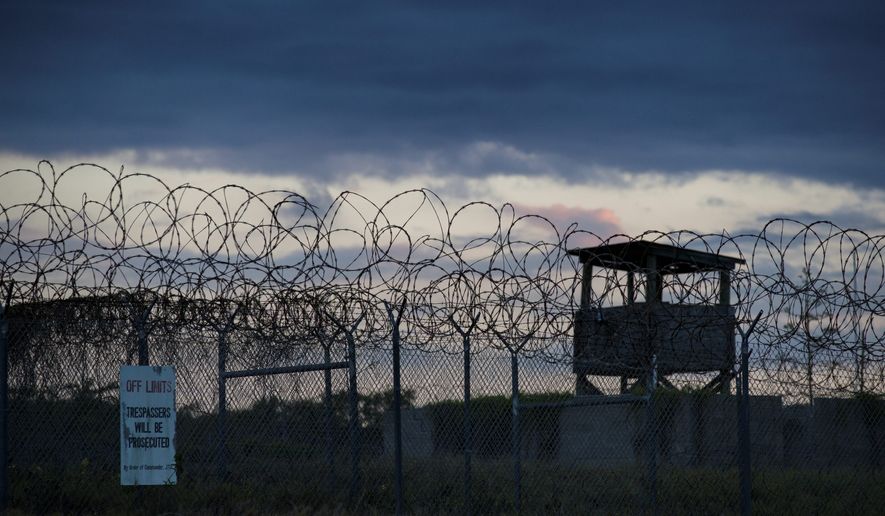House Democrats have put the U.S. military detention center at Guantanamo Bay, Cuba, back on the chopping block.
Democrats on the House Appropriations Committee eliminated funding for the terrorist prison camp in a draft defense budget released last week, reviving a debate over the global war on terrorism that has riled Washington since President George W. Bush occupied the White House.
The Pentagon spending bill, which includes a provision to cut funding for the facility by fall of 2022, would accelerate President Biden’s goal of closing the contentious facility by the time he leaves office.
“It’s time we finally close the detention facility at Guantanamo Bay,” said House Appropriations Defense subcommittee Chair Betty McCollum of Minnesota in a statement introducing the bill, which also would lift provisions blocking the transfer of detainees from the facility.
Few details have been released by the Biden administration about its plan to close the facility, including any potential plans to transfer the 40 detainees who remain.
Republicans on the Appropriations Committee described the provision to cut funding to the facility and the removal of language barring the transfer of detainees to the U.S. as troubling.
“These detainees are the worst of the worst, and we need assurance that they will not be moved to our soil,” said Rep. Kay Granger of Texas, ranking Republican on the House Appropriations Committee, during a committee markup.
Rep. Tony Gonzales, a Texas Republican on the committee, attempted to block the transfer of detainees by introducing an amendment to a separate military construction bill introduced by House Appropriations Democrats, which would have barred any spending to construct a facility in the U.S. to house the detainees.
But it remains unclear the extent to which Republicans can influence the committee’s push to close the facility. Committee Democrats overruled Mr. Gonzales’ amendment, 32-25, before passing the military construction bill.
“The fact is the Republican voices we would expect to be loudest on this issue in the House — people like [Reps.] Liz Cheney [of Wyoming] and Adam Kinzinger [of Illinois] — have almost no influence with their colleagues at this point,” Republican strategist Christopher Wilson told The Washington Times. “So there’s no one with a compelling voice to lead the opposition. Things might be different in the Senate because people like Lindsey Graham [South Carolina Republican] and others who might oppose closure are still in much stronger standing in that chamber.”
The Biden administration prioritized the facility’s closure soon after taking office. Mr. Biden also directed the National Security Council to complete a review of the facility and the “current state of play” that he inherited from the Trump administration, said White House press secretary Jen Psaki.
But soon after the administration announced the review in February, House Republicans began challenging any attempt to release or transfer any of the detainees.
Rep. Jeff Duncan, South Carolina Republican and staunch opponent of Obama-era attempts to close the facility, introduced a bill in late February to prohibit any release or transfer of any of the detainees.
“Naval Station Guantanamo Bay has long housed the most dangerous enemy combatants captured by our United States military,” Mr. Duncan said. “It is common-sense policy that we keep these terrorists far away from American citizens and out of our judicial system. Unfortunately, President Biden has signaled his intent to close the Guantanamo Bay facility, and now Speaker [Nancy] Pelosi and congressional Democrats appear ready to go along with his misguided policy.”
The move to close the facility is a continuation of a hallmark of the Obama White House that ultimately failed. President Obama issued an executive order in his first week in office mandating an immediate review of all detentions carried out at the facility, and its closure within one year.
But the move was stymied throughout his administration by legal complexity, geopolitical constraints, and domestic political hurdles.
At the time, 240 detainees were held at the facility, down from Bush-era peaks of nearly 800 prisoners, and they would have had to be transferred before it closed.
A year into the Obama administration, a task force identified 126 detainees who could be transferred, 48 detainees who were determined to be “too dangerous to transfer,” and 30 Yemeni detainees unable to be repatriated to their home country, given the security conditions in Yemen at the time. The remaining detainees included in the review were referred for prosecution.
The transfers were heavily contested in Congress. The 2011 defense spending bill restricted the military from funding any transfers of Guantanamo detainees to the U.S., and required the Secretary of Defense to certify any transfers to third countries. Similar provisions remained on the books through the remainder of Mr. Obama’s time in office and up until last year’s defense authorization.
Still, a total of 196 detainees were eventually transferred from the facility under the Obama administration, either through repatriation or resettlement. By the time Mr. Obama left office, only 41 prisoners remained at Guantanamo, including five who were previously found eligible for transfer.
The 36 remaining detainees were either subject to ongoing proceedings or determined to be ineligible for transfer.
Mr. Wilson said the issue has lost steam in recent years with the public.
“In a lot of ways, it’s like the withdrawal from Afghanistan, we’ve been there so long and so many other things have happened in the world and the country since that it’s just faded from view for the average American,” he said.
The defense spending bill is slated for full Appropriations Committee action later this month.
• Joseph Clark can be reached at jclark@washingtontimes.com.




Please read our comment policy before commenting.